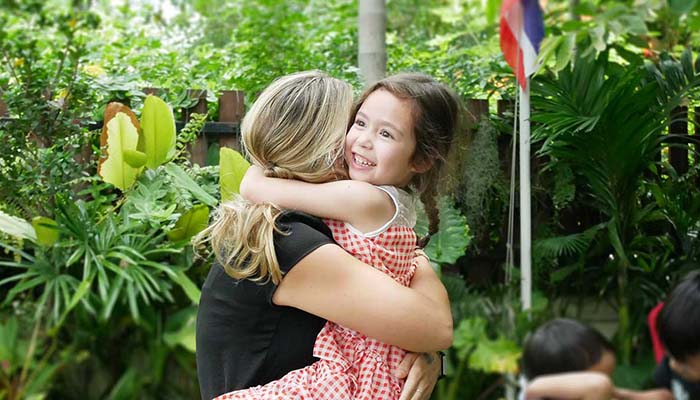What is the best school in Bangkok?

What is the best school in Bangkok?
Many parents ask us where they should send their children after life at the British Early Years Centre. It truly is the most difficult question to answer as we set very high standards for ourselves. We wouldn’t be doing what we are doing if we didn’t fully believe that we were one of the best schools out there. Most of our ideas about schools which provide the best education are usually based upon us knowing teaching friends and old colleagues who currently work in them. This is often the best way to find out exactly how good a school really is. I have always been a big believer in a school being only as good as its teaching staff. It it is them that make an average school, a great school. Even with a terrible management team in place, children can still make excellent developmental progress with a good teacher.
What makes any school the best choice very much depends on what you want for your child or rather what type of learner your child is. Every school promotes itself as the best in some way, often throwing around the latest trending slogan, such as “holistic learners” or promoting recycled educational terms such as “multiple intelligences”.
So how do we know which school to go for?
In an upcoming blog post we will be looking at the differences between a range of education systems, but when choosing from any school there are a few issues that need to be examined. There are good and bad features to any school, so do not be deterred if the school doesn’t fulfill every criteria. We all know that there is no school out there that is perfect in every way. There will always be something that we would like to change; the congested route to the school, the parking, the fees, the amount of teaching assistants. Aside from these factors that are more about the parent’s needs than the child’s, there are some very important considerations that any parent should focus on when selecting a school.
How many students are registered (with regards to the capacity of the school)? – I remember working for one school that had at best 160 students, however when showing prospective parents around they would regularly promote the school as having almost 300. It doesn’t make any difference how many children there are but it is a definite warning sign when they think high numbers is more important than the quality of education. Small schools often foster closer care but don’t discount bigger schools that are run well.
Resources- A good school will have a number of quality resources that are mostly modern and up to date. These will be available in every classroom. ICT is now a core subject in the UK, so tablets, roamers and computers should all be accessible, especially in the more expensive Bilingual and International Schools. Look around the classroom for educational games and that the children have enough art and DT equipment to nurture creativity.
The sales pitch- Marketing managers in Thailand have no real shame so be careful. I once looked round a Bilingual school where they wouldn’t let me examine any of the classrooms. They had special classrooms set up purely for prospective parents. These classes were full of toys and colourful furniture. It really was lovely. On the way past a “real” kindergarten class, I had a quick look through the window and all it had was grey tables, chairs and a whiteboard. I recently met a long-standing teacher at this chain of schools. He confirmed that this was exactly their strategy and this type of deception didn’t stop there. Entire play areas, crazy golf courses, soft play rooms and more were all off bounds to teachers and had literally never been used.
The best schools breed passionate educators– When you talk to the people showing you round the school, ask them questions about the curriculum and see how they respond. If they are natural and passionate about what they are doing, then the school is more likely to be genuinely good, however if you get text book answers reeled off they are probably more interested in getting you in rather than your child’s education. Find out what levels children at different ages should be attaining in your home country and actually ask to see examples of work once inside a classroom.
Take a look at the children’s books– There are two ends to the spectrum here. Sometimes the work might be terrible and the levels of the children might be very low. This should be a warning sign in itself, but don’t be fooled by perfect work either. Many schools give their children high grades or let them copy answers just to appease parents. A good set of books will have constructive criticism and a large portion of the work correct but with something to work on. They will also show a progression of skills from one day to another.
Staff rotation- The level of staff turnover is also a good gauge for how much a school cares about their staff. This information will be hard to find, but if you can get answers, it will give you another guide. Staff retention should be very important as it impacts greatly on the quality of education and the school community as a whole. Teachers and assistants (often Thai) are still not paid enough in Thailand and many schools do not treat staff well, resulting in a constant revolving door for staff coming and going. This is disrupting not only to the children but to the overall standard of education within a school.
Qualified Teachers- If you are looking at international schools the first thing I would ask is “are your teachers fully qualified?” The answer will no doubt be yes but still look to see if they have either a Bachelors certificate in education or a PGCE. This is the benchmark for a quality teacher. Whilst many international schools do now employ teachers with a PGCE in Primary and Secondary, most do not employ qualified teachers in Early Years. This is arguably the most important age group, particularly for children learning English as a second language. If the school makes excuses as to why they can’t show you certificates of qualifications, it probably means that the teaching staff is not qualified. For bilingual schools it is a bit different, teachers generally have degrees but are not teachers. Whilst I have met some very good unqualified teachers, you run the risk of them being awful too. CRB checks are very rarely done in Thai schools too and some international schools lapse in this area as well. My advice is that if you are looking at bilingual schools, is to chat with the teachers and get a feel for them yourself.
Talk to the teachers- Talking to the teachers is a great way to find out about a school. Obviously they are not going to put down the school whilst at work, but if the school is really good then the teachers will be passionate. If it is not you will more or less see it in their faces. There are, I would guess, literally 1000’s of disgruntled teachers working at Bilingual schools as they are renowned for not treating or paying staff well. Again, it will be pretty evident through a brief conversation about the curriculum.
Observe the children– Take a look at the children. How do they behave? Do they seem happy? Are they motivated in the class or slumped on the table? Early years children need to play, a lot! If this isn’t evident and you do not witness play, then be very careful. In Primary, activities should be fun and challenging and even though Secondary becomes more academic, lessons should still be enjoyable.
So what school should I choose?
We haven’t given any name of the schools that we have seen, as parents need to make up their own minds about what is right for both themselves and their child. There are some good schools around and you will find them, but like anything, it takes a bit (a lot) of searching. Google is as good a place as any to start the search, however many parents will say their school is good simply because they don’t know what to look for themselves. Aim higher, do the leg work and seek out the best.
British Early Years Centre is an International Kindergarten School in Bangkok. For more information please take a look at our website here…
